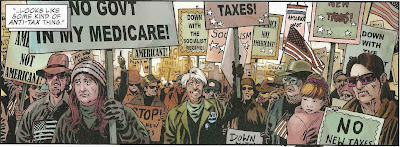Now we've all heard about the "Heroic Age." Norman Osborn was smacked down, the Sentry was killed, Steve Rogers is back, the Avengers are reinstated and everything is fantasti-awesome in the Marvel Universe.
.jpg)
Steve Rogers art by Mike Deodato and others, Image obtained from http://marvel.com/universe/
Yup, H.A.M.M.E.R. (Norman Osborn's perversion of S.H.I.E.L.D.) has been disbanded and the good guys are back in charge. Everything has been fixed. Only one thing hasn't been accounted for... the goddamn cost of it all.
Lets examine whats been happening in the last few years of the Marvel Universe, shall we? First there was a superhero Civil War, during which S.H.I.E.L.D. was restructured with super powered battle suits (called "cape-killers") to hunt down heroes.
In addition, Tony Stark became the head of S.H.I.E.L.D. and started building new devices and heli-carriers left and right (including a red and gold heli-carrier ala his Iron Man armor). I'm sure these changes (both substantive and cosmetic) came with a fairly hefty price. But that was just the beginning.
Then when Norman Osborn took over national security, he dismantled everything Stark had created and replaced it with his own version of hardware and manpower. This includes new soldiers and new weapons (granted they were created using stolen technology). He also reinvented the Avengers and revamped the super hero initiative by training and paying villains as personal hit squad. The massive amount of government funds appropriated for Osborn's "Dark Reign" should have shown up to even the most oblivious of congressional oversight commitees. But somehow, Osborn was allowed to continue employing supervillains and redirecting funds.

Norman Osborn, art by Mike Deodato and others, obtained from http://marvel.com/universe/
But that's all over right? Osborn got his butt kicked. He was removed from his position as head of the nation's defense and has been replaced with Steve Rogers (the man who was formerly Captain America). And with the new heroic morality that Steve Rogers brings to the position, surely fiscal responsibility will follow. Right?
Noooooooooope.
The first thing Steve Rogers does upon taking control of America's superheroic defenses is to dismantle H.A.M.M.E.R. He immediately, arrests the vicious H.A.M.M.E.R. soldiers and disable the institution itself. Rogers then reorganized S.H.I.E.L.D. and reformed 4 teams of Avengers. That's right 4 Avengers. The regular Avengers, the New Avengers, the Secret Avengers, and created an Academy for young Avengers who desperately need training. Rogers also re-did the Thunderbolts program under the guidance of Luke Cage.
Now, a revamp of national security obviously needed to be performed. Norman Osborn had spent a year perverting the nation's defenses into something awful. Steve Rogers had to make some changes. But it's the sheer volume of his changes I can't help but object to. One group of Avengers was enough for most of the history of the Marvel Universe. Then two were around, and they dealt with problems just fine. But here Steve Rogers has created multiple government-funded Avengers teams to protect the world. This on top of disbanding the superhero initiative (and thereby dismantling the very expensive infrastructure underlying the initiative) while trying to replace the gap in protection that initiative teams provided surely could tax the national budget.
Now, being a resident of New York State (where the schools are in desperate need of funding and services are constantly being cut), I've taken issue with Steve Rogers' willy nilly spending party. I think he needs to scale back his changes and take things slowly in light of the massive spending that the two previous men in his position indulged in.
No wonder the economy is tanking. We're all subsidizing a Secret Avengers trip to Mars.

Cover to Secret Avengers#1, art by Marko Djurdjevic, obtained from http://marvel.com/universe/
















